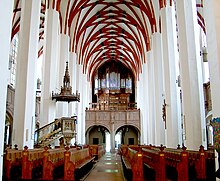Gelobet sei der Herr, mein Gott, BWV 129
| Gelobet sei der Herr, mein Gott | |
|---|---|
| BWV 129 | |
| Chorale cantata by J. S. Bach | |

|
|
| Occasion | Trinity Sunday |
| Performed | 8 June 1727: Leipzig |
| Movements | 5 |
| Chorale | "Gelobet sei der Herr, mein Gott" by Johann Olearius |
| Vocal |
|
| Instrumental |
|
Gelobet sei der Herr, mein Gott (Praised be the Lord, my God),BWV 129, is a church cantata by Johann Sebastian Bach. It is a chorale cantata performed on Trinity Sunday 8 June 1727 in Leipzig. Rediscovery of the printed libretto of the cantata in the first decade of the 21st century led to a re-appraisal of prior assumptions regarding the early performance chronology of a few cantatas, including this one.
The text of the cantata is a general praise of the Trinity, without a reference to a specific gospel reading. Addressing God the Creator, the Saviour and the Comforter, it could be used for other occasions such as Reformation Day. The cantata is festively scored and ends in a chorale fantasia, like the Christmas Oratorio.
The cantata was apparently composed for Trinity Sunday. Originally it was thought the cantata may have been performed as early as 16 June 1726. In his second year Bach had composed chorale cantatas between the first Sunday after Trinity of 1724 and Palm Sunday 1725, but for Easter that year he had returned to cantatas on more varied texts, possibly because he lost his librettist. Later Bach composed again chorale cantatas which may have been intended to complete his second annual cycle. This cantata was possibly one of such completing works. Rediscovery of the printed libretto of the cantata in the first decade of the 21st century led to a re-appraisal of prior assumptions regarding the first performance of this cantata: it was performed on Trinity Sunday 8 June 1727. The cantata may also have been performed on Reformation Day.
The cantata is based entirely on the unchanged words on the hymn Gelobet sei der Herr, mein Gott (1665) by Johann Olearius and celebrates the Trinity in five stanzas. The prescribed readings for Trinity Sunday were from the Epistle to the Romans, reflecting "depth of wisdom" (), and from the Gospel of John, the meeting of Jesus and Nicodemus (). Unlike most chorale cantatas of 1724/25, but similar to the early Christ lag in Todes Banden, BWV 4, and Lobe den Herren, den mächtigen König der Ehren, BWV 137, also composed after the second cantata cycle, Bach left the chorale text unchanged, thus without a reference to the readings.
...
Wikipedia
